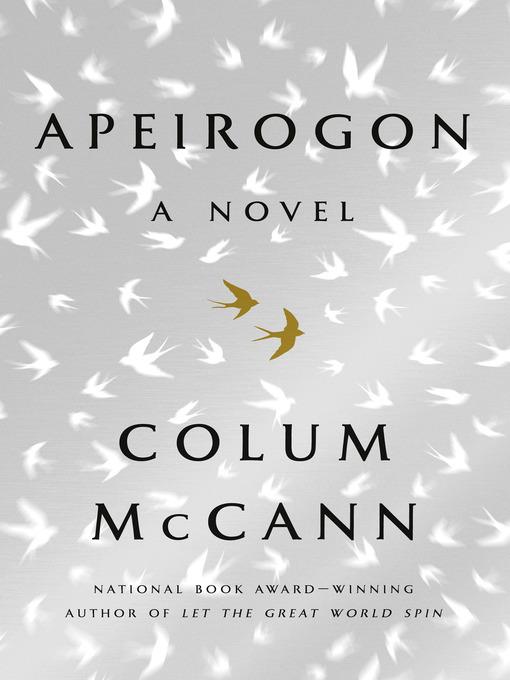
Apeirogon
A Novel
- اطلاعات
- نقد و بررسی
- دیدگاه کاربران
نقد و بررسی

September 1, 2019
In this latest from the National Book Award-winning and New York Times best-selling McCann, the lives of Palestinian Bassam Aramin and Israeli Rami Elhanan do not initially touch. But then Bassam's daughter Abir is killed by a rubber bullet even as Rami's daughter Smadar falls victim to a suicide bombing. After learning of each other's grief, the two fathers reach across borders to work for peace. In geometry, an apeirogon is an imaginary polygon with a countably infinite number of sides, but literature has a way of showing us what's possible.
Copyright 2019 Library Journal, LLC Used with permission.

November 15, 2019
An ambitious novel about an Israeli, a Palestinian, and the grief they share in common. Rami Elhanan and Bassam Aramin both lose their daughters when the girls are still young. Rami's Smadar dies in an explosion caused by suicide bombers; Bassam's Abir is killed by a rubber bullet. Rami is Israeli, Bassam Palestinian. They both become advocates for peace in the Middle East. McCann's (Thirteen Ways of Looking, 2015, etc.) latest novel is a soaring, ambitious triumph: It tells the stories of Rami and Bassam, both based on real people, and their daughters and their land and much else, besides. The novel is splintered into short, numbered segments that count up to 500 before crawling back down to 1. The effect is kaleidoscopic. McCann wheels outward in a widening circuit, not unlike the birds that form a central metaphor that recurs throughout the book. Some segments describe Israeli-Palestinian politics; others are composed of photographs; still others are made up entirely of quotes from figures as disparate as Picasso and Mahmoud Darwish. The result is a sprawling masterpiece but not a perfect one. Rarely does McCann incorporate the voices of women. Smadar and Abir are necessarily rendered silent by their deaths, but McCann doesn't make much space, either, for Rami's and Bassam's wives to inhabit. Nor does he assemble women writers, artists, and intellectuals with anything approaching the frequency with which he defers to figures like Darwish and Borges. Still, his writing on the Israeli-Palestinian conflict is deeply nuanced and sensitive to the afflictions of both sides. As a whole, the book is a remarkable achievement. Imperfect but ultimately triumphant, McCann's latest novel might be his finest yet.
COPYRIGHT(2019) Kirkus Reviews, ALL RIGHTS RESERVED.

Starred review from December 2, 2019
National Book Award–winner McCann (Let the Great World Spin) bases this masterful novel on the lives of two real men working together toward Middle Eastern peace. Rami Elhanan, 67 on the single day of 2016 on which the main narrative takes place, is a graphic designer and Israeli military veteran. In September 1997, his 13-year-old daughter, Smadar, was killed in a Jerusalem suicide bombing. His need for revenge fades when he joins the Parents’ Circle, whose members, of many nationalities and religions, have all lost a child in the Israel/Palestine conflict. Nineteen years younger than Elhanan, Palestinian Bassam Aramin is jailed in 1985, at 17, for resisting the Israeli occupiers in Hebron, where he’s raised. During his imprisonment, writings by Gandhi, among others, and friendship with one of the Israeli guards convince him of the power of nonviolence. Released after seven years, he helps found Combatants for Peace, which brings Palestinian and Israeli fighters—among them Elhanan’s son, who introduces the two men—together for dialogue. The fatal 2005 shooting of Bassam’s 10-year-old daughter, Abir, by an Israeli border guard doesn’t shake his belief that Israelis and Palestinians share “an equity of pain”; he and Elhanan begin meeting daily, using their daughters’ stories to become international advocates for peace. The book’s title is a reference to a polygon with a countable but infinite number of sides, and McCann evokes the experience of its protagonists and their region through 1,001 brief numbered segments that incorporate sequences in the men’s own voices and interconnect topics including bullet manufacturing, Jorge Luis Borges, and birds. Balancing its dazzling intellectual breadth with moments of searing intimacy, this is a transformative vision of a historic conflict and a triumph of the novelist’s art. Agent: Sarah Chalfant, Wylie Agency.

Starred review from December 1, 2019
An apeirogon is a shape with a countably infinite number of sides, embodying the complexity McCann seeks to express in this tragic and transporting "hybrid novel." In his National Book Award-winner, Let the Great World Spin (2009), two women from opposite ends of the social spectrum lost sons in the Vietnam War. Here McCann portrays two fathers, one Palestinian, the other Israeli, each mourning a young daughter who died in the region's persistent, senseless bloodshed. Bassam Aramin and Rami Elhanan are real people, and the stories of how Abir Aramin and Smadar Elhanan were killed, and of how Bassam and Rami became peace activists and border-defying friends, are true. McCann meshes the actual and the imagined in concise, numbered passages totaling 1,001 in homage to the Arabian Nights. Each is exquisite and haunting, many are harrowing, and together they form an entrancing and unnerving associative collage of fact, memory, observation, and invention. He discovers startling connections while pondering weaponry and poetry, migrating birds and explorers, torture and checkpoints, the music of John Cage and Phillip Petit walking for peace on a tightrope over Jerusalem. McCann performs his own epic balancing act between life and art, writing with stunning lyricism and fluent empathy as he traces the ripple effects of violence and grief, beauty, and the miraculous power of friendship and love, valor and truth.HIGH-DEMAND BACKSTORY: Globally best-selling McCann always commands attention and the daring subject and structure of this resounding novel will double its pull.(Reprinted with permission of Booklist, copyright 2019, American Library Association.)




دیدگاه کاربران